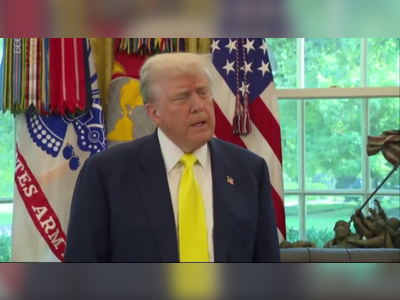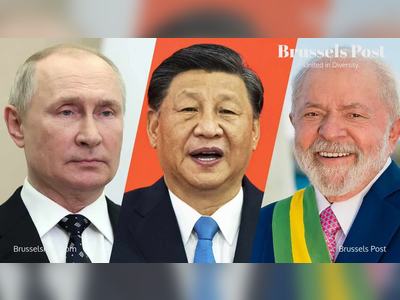
European Parliament Responds to US Tariffs with Calls for Dialogue and Firmness
In the wake of new protectionist measures announced by the US, the European Parliament expresses a commitment to unity and negotiation.
The European Parliament has expressed concern over the recent tariffs imposed by the United States on imports from global partners, a move described as ushering in a 'new trade era.' The tariffs, announced by U.S. President Donald Trump, have prompted a strong reaction from European officials, who believe that retaliatory measures are necessary, though they aim to avoid escalating tensions further.
The President of the European Parliament’s Committee on International Trade (INTA), Bernd Lange, characterized the U.S. actions as 'unjustified, illegal, and disproportionate,' stating that these measures would negatively impact consumers and producers in both the EU and the U.S., as well as exacerbate challenges for developing countries.
Lange emphasized the need for a political agreement to avert a wider inflationary spiral resulting from the tariffs.
Liberal MEP Sandro Gozi characterized the U.S. tariffs as a 'dramatic geopolitical own goal,' cautioning that the EU would not be retreating in the face of such measures.
Officials from Italy's 5 Star Movement also described the tariffs as 'economic madness,' stressing the importance of a firm and prompt response from the EU to protect local industries.
The tariffs come in response to what the Trump administration claims is a significant imbalance in trade practices, asserting that a combined rate of tariffs and non-monetary trade barriers justifies the imposition of a 20 percent duty on European goods.
Lange countered this narrative by pointing out that the average tariffs currently in place between the EU and the U.S. are around 5 percent, significantly lower than the U.S. figure.
He further criticized the U.S. administration for misunderstanding the nature of contemporary trade, which includes not just goods but a $100 billion surplus in services.
The EU's strategy in light of these tariffs aims for a negotiated resolution, as EU officials believe that avoiding retaliation is not a viable option.
Jörgen Warborn, a spokesperson for the European People's Party on International Trade, noted that any response would need to be 'proportional, balanced, and in line with World Trade Organization (WTO) rules.' He also indicated the necessity of a structural reform of the WTO to adapt to current global trade dynamics.
Plans for a coordinated EU response are already underway, with the INTA committee set to work with the Directorate-General for Trade to formulate a measured reaction.
An initial European retaliation against U.S. tariffs on steel and aluminum is anticipated by April 14, with subsequent countermeasures planned based on a comprehensive analysis of the existing tariffs’ impacts.
Lange assured that the aim is to limit countermeasures to mitigate damage rather than escalate the situation.
Discussions to engage U.S. Congress on this matter are also being prioritized, with a delegation from the European Parliament expected to travel to Washington for talks with congressional members and other officials.
Amidst these developments, European leaders are asserting their commitment to defending the EU's legislative framework and economic interests.
Lange reiterated that the legislative approaches taken by the EU are defensive in nature, contrasting them with the 'offensive' measures pursued by the Trump administration.
The integrity of the single market, as underscored by European Commission President Ursula von der Leyen, is now seen as crucial for the collective strength and resilience of the EU in the face of external pressures.
Italian politicians have reacted firmly, with Nicola Zingaretti, leader of the PD delegation in the European Parliament, emphasizing the need for a united European front in negotiations, while criticizing the Italian government's approach as potentially detrimental to national interests.
The 5 Star Movement has likewise called for urgent measures against the tariffs, highlighting the broader economic implications for both European exporters and American consumers.
This situation continues to evolve as the EU intensifies its preparations for future negotiations, aiming to fortify its position in global trade and diminish reliance on potentially adversarial economic relationships.
The President of the European Parliament’s Committee on International Trade (INTA), Bernd Lange, characterized the U.S. actions as 'unjustified, illegal, and disproportionate,' stating that these measures would negatively impact consumers and producers in both the EU and the U.S., as well as exacerbate challenges for developing countries.
Lange emphasized the need for a political agreement to avert a wider inflationary spiral resulting from the tariffs.
Liberal MEP Sandro Gozi characterized the U.S. tariffs as a 'dramatic geopolitical own goal,' cautioning that the EU would not be retreating in the face of such measures.
Officials from Italy's 5 Star Movement also described the tariffs as 'economic madness,' stressing the importance of a firm and prompt response from the EU to protect local industries.
The tariffs come in response to what the Trump administration claims is a significant imbalance in trade practices, asserting that a combined rate of tariffs and non-monetary trade barriers justifies the imposition of a 20 percent duty on European goods.
Lange countered this narrative by pointing out that the average tariffs currently in place between the EU and the U.S. are around 5 percent, significantly lower than the U.S. figure.
He further criticized the U.S. administration for misunderstanding the nature of contemporary trade, which includes not just goods but a $100 billion surplus in services.
The EU's strategy in light of these tariffs aims for a negotiated resolution, as EU officials believe that avoiding retaliation is not a viable option.
Jörgen Warborn, a spokesperson for the European People's Party on International Trade, noted that any response would need to be 'proportional, balanced, and in line with World Trade Organization (WTO) rules.' He also indicated the necessity of a structural reform of the WTO to adapt to current global trade dynamics.
Plans for a coordinated EU response are already underway, with the INTA committee set to work with the Directorate-General for Trade to formulate a measured reaction.
An initial European retaliation against U.S. tariffs on steel and aluminum is anticipated by April 14, with subsequent countermeasures planned based on a comprehensive analysis of the existing tariffs’ impacts.
Lange assured that the aim is to limit countermeasures to mitigate damage rather than escalate the situation.
Discussions to engage U.S. Congress on this matter are also being prioritized, with a delegation from the European Parliament expected to travel to Washington for talks with congressional members and other officials.
Amidst these developments, European leaders are asserting their commitment to defending the EU's legislative framework and economic interests.
Lange reiterated that the legislative approaches taken by the EU are defensive in nature, contrasting them with the 'offensive' measures pursued by the Trump administration.
The integrity of the single market, as underscored by European Commission President Ursula von der Leyen, is now seen as crucial for the collective strength and resilience of the EU in the face of external pressures.
Italian politicians have reacted firmly, with Nicola Zingaretti, leader of the PD delegation in the European Parliament, emphasizing the need for a united European front in negotiations, while criticizing the Italian government's approach as potentially detrimental to national interests.
The 5 Star Movement has likewise called for urgent measures against the tariffs, highlighting the broader economic implications for both European exporters and American consumers.
This situation continues to evolve as the EU intensifies its preparations for future negotiations, aiming to fortify its position in global trade and diminish reliance on potentially adversarial economic relationships.
AI Disclaimer: An advanced artificial intelligence (AI) system generated the content of this page on its own. This innovative technology conducts extensive research from a variety of reliable sources, performs rigorous fact-checking and verification, cleans up and balances biased or manipulated content, and presents a minimal factual summary that is just enough yet essential for you to function as an informed and educated citizen. Please keep in mind, however, that this system is an evolving technology, and as a result, the article may contain accidental inaccuracies or errors. We urge you to help us improve our site by reporting any inaccuracies you find using the "Contact Us" link at the bottom of this page. Your helpful feedback helps us improve our system and deliver more precise content. When you find an article of interest here, please look for the full and extensive coverage of this topic in traditional news sources, as they are written by professional journalists that we try to support, not replace. We appreciate your understanding and assistance.











